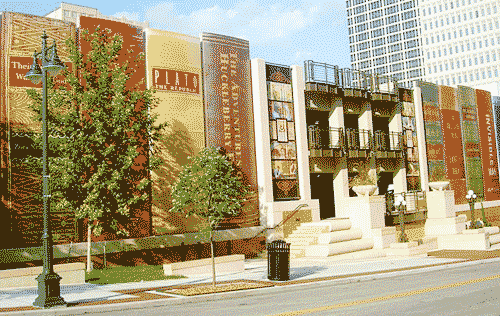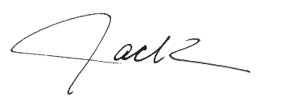How the Public Library
Transformed Kansas City

Tune in for what's new in Kansas: It's a web-based news site, and regularly published journal, dedicated to limited government in the great state of Kansas. |
![]()
by Jack Cashill
Published in ingramsonline.com - March 2011
If you read a hundred tourist guides for a hundred major cities, you will find not a one that boasts of its public library. For the moment, this includes Kansas City, but it ought not.
While our civic boosters have been bragging about the things every city brags about, the Kansas City Public Library has uniquely and improbably fashioned itself into the cultural center of the metro.
I say “improbably” because just 10 years ago, the Euro-trashy Downtown Library served primarily as a daytime hangout for the city’s thriving hobo population, and the more congenial Plaza Library was best known for its cracking floors and collapsing boiler.
And now I, like thousands throughout the metro, I find myself checking the library program to see how I might spend my evenings for the coming week. Recently, for instance, I joined an overflow crowd at the Plaza’s new Truman Forum to see Russian chess champion and political dissident Gary Kasparov dazzle with his wit and wisdom.
Word to the wise: don’t try to bait a chess master with a conventional opening gambit. He will have formulated about 12 steps’ worth of devastating responses before you have finished your first foolish question.
Some weeks later, in the splendid lobby of the Central Library Downtown, I joined another overflow crowd to see Harvard historian Jill Lepore discuss her new book, The Whites of Their Eyes: The Tea Party’s Revolution and the Battle Over American History.
Although I agreed with little that Lepore said, I suspect that she would have found ample disagreement with what I said at the presentation of my own new book, Deconstructing Obama, before—excuse my immodesty—an overflow crowd at the Truman Forum this past month.
Therein lies the secret of the library’s success: its organizers accommodate people like me. Unlike, say, the budding elitists at KCUR or The Kansas City Star, the library execs understand that no one ideological faction should own the public square, especially when that faction is in the minority here in red-meat America.
For all the library’s success, the “history” page on its Web site does not even mention the name of the man who was a driving force for its transformation to life. That, of course, would be Jonathan Kemper, the CEO of Commerce Bank, Kansas City.
When Kemper first started talking about resurrecting the library, I confess to having doubted his vision. I suggested that he think of centralizing the library at the Plaza. At the very least, I argued, he avoid a retaining wall like the one at the entrance to the Downtown Library around which the layabouts then hovered like a rude, drunken Swiss Guard.
Happily for KC, Kemper and committee ignored my first suggestion, and the second one took care of itself. They focused their attention on the former First National Bank building at 10th and Baltimore, a century-old building that in its marbled magnificence recalls that imperial banking era of yore. Tapping every funding source known to man, public and private, Kemper and his allies raised the $50 million to create the library.

As a useful bit of whimsy, in a spirit not unlike that behind the Nelson-Atkins’ shuttlecocks, library planners coated the visible south face of the library’s new parking garage with the 25-foot high replica of a shelf lined with books. (See above.) Among the 22 classics featured on the “community bookshelf” are a few with which I would take issue—Rachel Carson’s Silent Spring comes to mind—but “taking issue” is at the heart of the library’s mission.
Seeing to that are Crosby Kemper III, the library’s chief executive, and his inspired public affairs director, Henry Fortunato. On the occasion of the aforementioned Ms. Carson’s 100th birthday a few years ago, folks at the University of Kansas volunteered to do a program at the library to commemorate it.
As I argued in my book Hoodwinked, however, millions of people who aren’t alive today might be had Carson turned her talents to fiction or identified Silent Spring as such, for much of it surely is. Her successful drive to ban DDT, based largely on fear and junk science, has allowed malaria to flourish in third-world countries that had all but conquered it.
Instead of a dreamy, one-sided celebration of Carson, Kemper suggested instead a debate between the KU Carson gurus and me. I was totally game. They weren’t. Like the folks at KCUR and The Star, they preferred their university echo chamber. Too bad.
Kemper had made the same offer to a guy who wrote an exculpatory book on convicted Philadelphia cop-killer and NPR commentator Mumia Abu-Jamal, whom I also sliced and diced in Hoodwinked. This author also refused to venture out of his tiny echo chamber and declined.
So too, for that matter, did What’s the Matter with Kansas author Thomas Frank. When KCPT, the local public TV station, offered that he share TV time with the author of What’s the Matter with California, namely moi, our favorite Mission Hills Marxist said “Nyet.”
This collective reluctance stems not from my fearsome reputation as a debater, but from the fact that many of these folks rightly sense that their foolishness won’t survive a debate.
In contrast with the library, KCUR’s Up to Date with Steve Kraske declined to have me on to discuss either of my last two books, including my relatively apolitical Popes and Bankers, and the Star know-it-alls don’t even answer my e-mails.
I don’t take this personally. In defiance of all market sense, these editors and producers have chosen to write off people like me, despite the fact that people like me won the day this past November in 97 of the 100 counties closest to Kansas City.
Although Vivien Jennings and Roger Doeren at Rainy Day Books likely vote the same way that Star people do, they have a dramatically keener grasp on marketing. No discussion of civic culture would be complete without acknowledging Rainy Day’s contribution.
This past November, for instance, Rainy Day hosted George W. Bush at the Unity Temple on the Plaza to discuss his new bestseller, Decision Points. I had to scramble to get a ticket from Vivien because the 700 seats were snapped up in a heartbeat. As to format, she interviewed Bush on stage and did a nicely sensitive job of the same.
Few people in that audience read The Star or listen to KCUR, but they do read, and they do listen, and as their attendance suggests, they appreciate Rainy Day and the library, which, in fact, often collaborate on projects.
The radio station and newspaper seem to be beyond salvation, but there is a message here for other institutions, other media, other libraries, not to mention our often clueless universities: Remember where you live—and who pays your bills.


